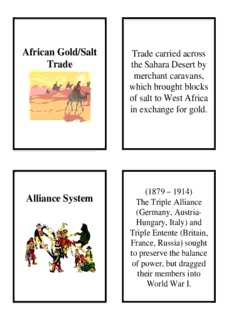
AP World History Flash Cards PDF
Preview AP World History Flash Cards
African Gold/Salt Trade carried across Trade the Sahara Desert by merchant caravans, which brought blocks of salt to West Africa in exchange for gold. (1879 – 1914) Alliance System The Triple Alliance (Germany, Austria- Hungary, Italy) and Triple Entente (Britain, France, Russia) sought to preserve the balance of power, but dragged their members into World War I. Al-Qaeda (1988 – Present) Terrorist organization formed by Osama bin Laden. Archimedes (287 – 212 BC) Greek mathematician who studied density, levers, and pulleys and invented a screw pump device. Armenians Christians in the Ottoman Empire who faced genocide during World War I. Arms Race Any race to develop better weapons, such as the race between the United States and the Soviet Union to develop more powerful nuclear bombs. Thomas Aquinas (1225 – 1274) Catholic thinker who believed in natural laws based on reason and in the right to defy unjust laws. Atlantic Slave (16th – 19th Centuries) Trade Captured Africans were transported across the Atlantic under horrific conditions to labor in the Americas in mines and plantations. American scientists Atomic Bomb developed a bomb based on atomic energy, which was used against the Japanese cities of Hiroshima and Nagasaki. Balkans Mountainous region of southeastern Europe that provided the spark igniting World War I. In the 1990’s the Balkans experienced “ethnic cleansing” by Serbs against Muslims. Azt ec Civilization A complex pre- Columbian civilization in Central Mexico with a highly complex social organization, a yearly calendar, and a tradition of human sacrifices. Black Death (circa 1350) A disease carried on ships from Asia to Europe that killed millions of people and helped to end serfdom in Europe. William (1730 – 1780) English jurist who Blackstone explained the common law, and who defined the rights of individuals under English law. Bolsheviks Party of Lenin that won the support of the people by promising “Peace, Bread, and Land,” and which led the “October” Revolution of 1917 in Russia. S ímon Bolivar (1723 – 1780) Leader for independence who defeated Spanish forces in South America, liberating Venezuela, Colombia, Ecuador, Peru, and Bolivia. Napoleon (1769 – 1821) General during the Bonaparte French Revolution, who seized power in 1799, declared himself emperor in 1804, and conquered much of Europe. (1627 – 1691) Robert Boyle Irish chemist who conducted experiments on gases at different temperatures. He is sometimes known as the “Father of Chemistry.” (330 – 1453) Eastern part of the Roman Empire that Byzantine Empire survived the fall of Rome, with its capital at Constantinople. It developed Eastern Orthodox Christianity and the Justinian Code. Buddhism A religion based on the idea of self-denial taught by Gautama Buddha. Buddhists try to follow the Four Noble Truths and the Eightfold Path. John Calvin (1509 – 1564) He began a new Protestant Church in Geneva based on belief in predestination, faith as the key to salvation, and a strict moral code.
Description: